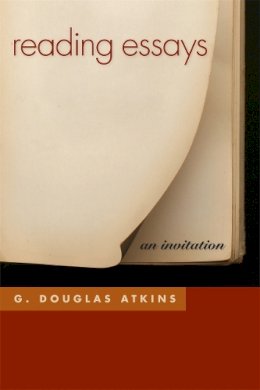
Reading Essays
G.Douglas Atkins
Approaches abound to help us beneficially, enjoyably read fiction, poetry, and drama. Here, for the first time, is a book that aims to do the same for the essay. G. Douglas Atkins performs sustained readings of more than twenty-five major essays, explaining how we can appreciate and understand what this currently resurgent literary form reveals about the “art of living.”
Atkins’s readings cover a wide spectrum of writers in the English language—and his readings are themselves essays, gracefully written, engaged, and engaging. Atkins starts with the earliest British practitioners of the form, including Francis Bacon, John Dryden, Alexander Pope, and Samuel Johnson. Transcendentalist writers Henry David Thoreau and Ralph Waldo Emerson are included, as are works by Americans James Baldwin, Zora Neale Hurston, and E. B. White. Atkins also provides readings of a number of contemporary essayists, among them Annie Dillard, Scott Russell Sanders, and Cynthia Ozick.
Many of the readings are of essays that Atkins has used successfully in the classroom, with undergraduate and graduate students, for many years. In his introduction Atkins offers practical advice on the specific demands essays make and the unique opportunities they offer, especially for college courses. The book ends with a note on the writing of essays, furthering the author’s contention that reading should not be separated from writing.
Reading Essays continues in the tradition of such definitive texts as Understanding Poetry and Understanding Fiction. Throughout, Atkins reveals the joy, delight, grace, freedom, and wisdom of “the glorious essay.”
Product Details
About G.Douglas Atkins
Reviews for Reading Essays
Lydia Fakundiny
editor of The Art of the Essay
In three decades of writing and pondering essays, I have been seeking a book that grasps the four-hundred-year history of this adventurous form, and that does so with the wit, suppleness, curiosity, and emotional and intellectual range one expects of the finest essays. And now here at last is such a book. Atkins reads individual works with a sympathetic yet rigorous imagination, all the while elucidating a mode of writing that is also a mode of thinking, feeling, and living. I am eager to put this book into the hands of students, and into the hands of anyone who wonders why, in our time, the essay is generating so much heat and light.
Scott Russell Sanders
author of A Private History of Awe
Reading Essays: An Invitation is one that you ought to affirm and go to. . . . It can sharpen your thinking and possibly even improve your writing and expressing your thoughts.
Paiso Jamakar
Biz India
